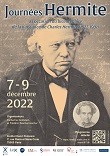
à l'occasion du bicentenaire de sa naissance
Institut Henri Poincaré, 11 rue Pierre et Marie Curie (75005 Paris)
Colloque international à l’occasion de bicentenaire de sa naissance, organisé par Frédéric Brechenmacher (LINX, Ecole polytechnique) et Catherine Goldstein (IMJ-PRG, CNRS, Sorbonne Université, Université Paris Cité) avec le soutien de l’Institut Henri Poincaré, du laboratoire LINX (Ecole polytechnique), de l’Institut de mathématiques de Jussieu-Paris Rive Gauche, de l’UFR de mathématiques de Sorbonne Université et du GDR 3398 d’Histoire des mathématiques
Charles Hermite est l’un des mathématiciens les plus importants du XIXe siècle, connu pour ses travaux sur les minima de formes quadratiques, les fonctions elliptiques, les équations algébriques et différentielles et bien sûr pour la preuve de la transcendance de e. Son nom est encore attaché à de nombreux concepts familiers des mathématiques actuelles, des formes et des matrices hermitiennes aux polynômes ou à la constante d’Hermite. Il a entretenu des correspondances étendues, souvent sur plusieurs décennies, avec des dizaines de scientifiques aussi divers Thomas Stieltjes, Gösta Mittag-Leffler, Henri Poincaré, Angelo Genocchi, James Joseph Sylvester, Mathias Lerch ou Leopold Kronecker.
Néanmoins sa prédilection pour les formules effectives et l’éparpillement de ses résultats entre notes, cours, lettres, rendant difficile l’abord de ses mémoires, son scepticisme devant les
innovations conceptuelles les plus connues de la fin du XIXe siècle, comme la théorie des ensembles ou les géométries non-euclidiennes, tout autant que son hostilité à la République, ont contribué à brouiller son image globale.
Ces journées organisées à l’occasion du bicentenaire de sa naissance réuniront des spécialistes de plusieurs branches de mathématiques et d’histoire des mathématiques. Elles visent à mettre en évidence et à discuter, à la lumière de recherches récentes et en cours, des aspects moins connus du travail d’Hermite et de ses liens internationaux, mais aussi à mieux comprendre la diffusion de ses recherches, et à préciser et réévaluer sa place dans les mathématiques de son temps et du nôtre.
Avec des interventions (en anglais ou en français) de
Thomas Archibald (Simon Fraser University)
Jean-Benoit Bost (Université Paris-Saclay)
Alin Bostan (INRIA)
Frédéric Brechenmacher (Ecole polytechnique)
Barnabé Croizat (Université de Lille I)
Livia Giacardi (Università di Torino) et Rossana Tazzioli (Université de Lille I)
Hélène Gispert (Université Paris-Saclay)
Catherine Goldstein (CNRS, IMJ-PRG, Sorbonne Université, UPC)
Nathalia Ingtem (Université d'Etat de Moscou Lomonossov, distanciel)
François Lê (ICJ, Université de Lyon I)
Karen Hunger Parshall (University of Virginia)
Anne Quéguiner-Mathieu (LAGA, Université Sorbonne Paris Nord)
Marija Šegan-Radonjić (SANU, Serbian Academy of Sciences and Arts) et
Vesna Todorcevic (SANU, Faculty of Organizational Sciences of Belgrade)
Yannick Vincent (Ecole polytechnique)
Inscription (gratuite, mais obligatoire)
Hermite Conference: December 7-9 2022
Institut Henri Poincaré, 11 rue Pierre et Marie Curie (75005 Paris)
International Conference commemorating the bicentenary of his birth, organized by Frédéric Brechenmacher (LINX, Ecole polytechnique) and Catherine Goldstein (IMJ-PRG, CNRS, Sorbonne Université, Université Paris Cité) with the support of the Institut Henri Poincaré, of LINX (Ecole polytechnique), of the Institut de mathématiques de Jussieu-Paris Rive Gauche, of the UFR de mathématiques de Sorbonne Université and of the GDR 3398 of History of mathematics
Charles Hermite is one of the most important mathematicians of the 19th century, known for his work on minima of quadratic forms, on elliptic functions, on algebraic and differential equations and of course for the first proof of the transcendence of e. His name is still attached to many familiar concepts in today's mathematics, from Hermitian forms and matrices to Hermite polynomials or the Hermite constant. He also maintained extensive correspondence, often over several decades, with dozens of scientists as diverse as Thomas Stieltjes, Gösta Mittag-Leffler, Henri Poincaré, Angelo Genocchi, James Joseph Sylvester, Mathias Lerch or Leopold Kronecker.
Nevertheless, his predilection for effective formulas and the scattering of his results among notes, lectures and letters, his scepticism towards the best-known conceptual innovations of the end of the 19th century,
such as set theory or non-Euclidean geometries, as well as his hostility to the Republic, have contributed to blurring his overall image.
This conference organised on the occasion of the bicentenary of his birth will bring together specialists in several branches of mathematics and in the history of mathematics. It aims to highlight and discuss, in
the light of recent and ongoing research, lesser-known aspects of Hermite's work and of his international links, to better understand the diffusion of his research, and to clarify and reassess his place in the
mathematics of his time and ours.
Speakers:
Thomas Archibald (Simon Fraser University)
Jean-Benoit Bost (Université Paris-Saclay)
Alin Bostan (INRIA)
Frédéric Brechenmacher (Ecole polytechnique)
Barnabé Croizat (Université de Lille I)
Livia Giacardi (Università di Torino) et Rossana Tazzioli (Université de Lille I)
Hélène Gispert (Université Paris-Saclay)
Catherine Goldstein (CNRS, IMJ-PRG, Sorbonne Université, UPC)
Nathalia Ingtem (Université d'Etat de Moscou Lomonossov, online)
François Lê (ICJ, Université de Lyon I)
Karen Hunger Parshall (University of Virginia)
Anne Quéguiner-Mathieu (LAGA, Université Sorbonne Paris Nord)
Marija Šegan-Radonjić (SANU, Serbian Academy of Sciences and Arts) et
Vesna Todorcevic (SANU, Faculty of Organizational Sciences of Belgrade)
Yannick Vincent (Ecole polytechnique)
Registration (free but compulsory)



